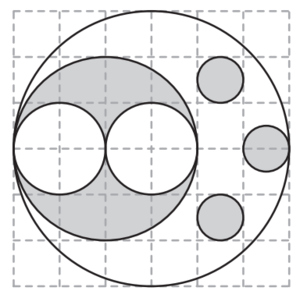Difference between revisions of "2023 AMC 8 Problems/Problem 12"
(→Solution 1) |
(→Solution 2) |
||
| Line 18: | Line 18: | ||
==Solution 2== | ==Solution 2== | ||
| − | Pretend each circle is a square. The second largest circle is a square with area <math>16\text{units}^2</math> and there are two squares in that square that each have area <math>4\text{units}^2</math> which add up to 8. Subtracting the medium-sized squares' areas from the second-largest square's area, we have <math>8\text{units}^2</math>. The largest circle becomes a square that has area <math>36\text{units}^2</math>, and the three smallest circles become three squares with area <math>8\text{units}^2</math> and add up to <math>3^2</math>. Adding the areas of the shaded regions we get <math>11</math>, so our answer is <math>\boxed{\text{(B)}\dfrac{11}{36}}</math>. | + | Pretend each circle is a square. The second largest circle is a square with area <math>16\text{units}^2</math> and there are two squares in that square that each have area <math>4\text{units}^2</math> which add up to 8. Subtracting the medium-sized squares' areas from the second-largest square's area, we have <math>8\text{units}^2</math>. The largest circle becomes a square that has area <math>36\text{units}^2</math>, and the three smallest circles become three squares with area <math>8\text{units}^2</math> and add up to <math>3^2</math>. Adding the areas of the shaded regions we get <math>11</math>, so our answer is <math>\boxed{\text{(B)}\ \dfrac{11}{36}}</math>. |
-claregu LaTeX edits -apex304 | -claregu LaTeX edits -apex304 | ||
| − | |||
==Video Solution (Animated)== | ==Video Solution (Animated)== | ||
Revision as of 08:33, 25 January 2023
Problem
The figure below shows a large white circle with a number of smaller white and shaded circles in its interior. What fraction of the interior of the large white circle is shaded?
![]()
Solution 1
First the total area of the ![]() radius circle is simply just
radius circle is simply just ![]() . Using our area of a circle formula.
. Using our area of a circle formula.
Now from here we have to find our shaded area. This can be done by adding the areas of the ![]()
![]() radius circles and add then take the area of the
radius circles and add then take the area of the ![]() radius circle and subtracting that from the area of the
radius circle and subtracting that from the area of the ![]() , 1 radius circles to get our resulting complex area shape. Adding these up we will get
, 1 radius circles to get our resulting complex area shape. Adding these up we will get ![]()
Our answer is ![]()
~apex304
Solution 2
Pretend each circle is a square. The second largest circle is a square with area ![]() and there are two squares in that square that each have area
and there are two squares in that square that each have area ![]() which add up to 8. Subtracting the medium-sized squares' areas from the second-largest square's area, we have
which add up to 8. Subtracting the medium-sized squares' areas from the second-largest square's area, we have ![]() . The largest circle becomes a square that has area
. The largest circle becomes a square that has area ![]() , and the three smallest circles become three squares with area
, and the three smallest circles become three squares with area ![]() and add up to
and add up to ![]() . Adding the areas of the shaded regions we get
. Adding the areas of the shaded regions we get ![]() , so our answer is
, so our answer is ![]() .
.
-claregu LaTeX edits -apex304
Video Solution (Animated)
~Star League (https://starleague.us)










